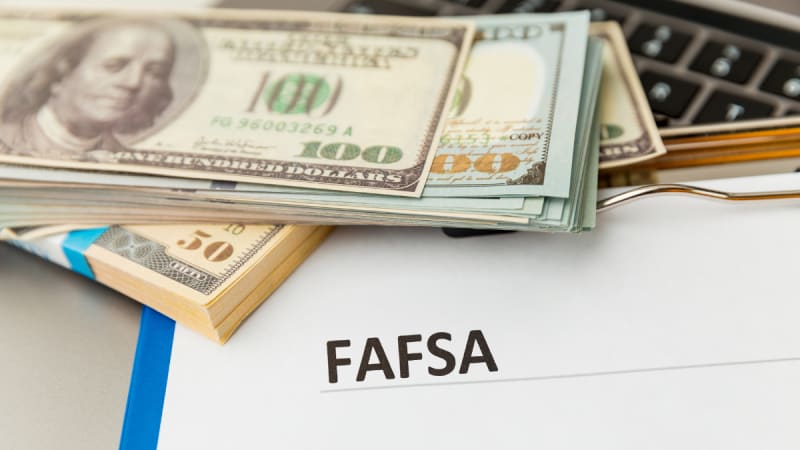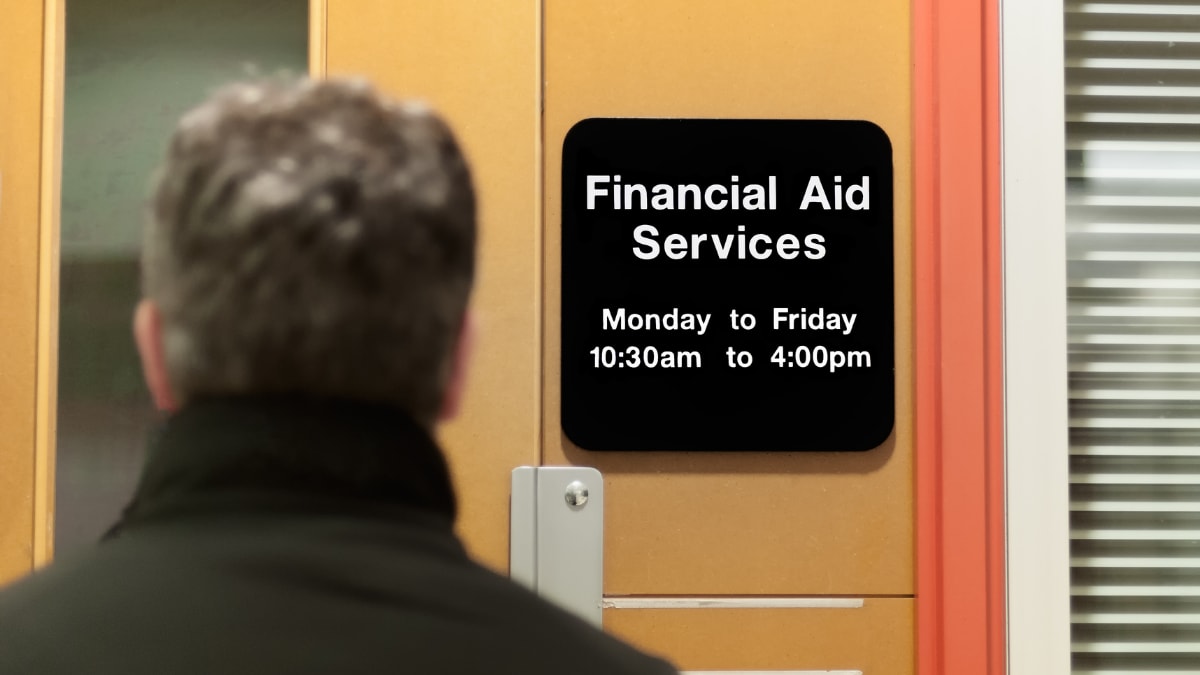Online Colleges That Accept FAFSA

Many students miss out on valuable federal student loans and financial assistance opportunities due to a lack of knowledge about which online institutions participate in federal aid programs. Our education experts list the accredited online colleges that accept FAFSA so you can fund your education without compromising your finances and academic prospects.
Accredited Online Colleges That Accept FAFSA
Many accredited institutions now accept the FAFSA to support college students in their academic pursuits. Notable examples of such schools include the University of Arizona Global Campus, California Baptist University, and University of Florida Online, which offer diverse programs and flexible learning options.

Online education has revolutionized access to higher learning. These institutions provide students the opportunity to combine the convenience of online study with the financial support offered through federal aid programs. With this list, we aim to help make higher education more accessible to students without depending too much on private loans.
Key Takeaways
- Every student in accredited colleges should apply for FAFSA regardless of their socioeconomic background. Times change and so will your financial status change as you pursue your college degree, not to mention that federal financial aid will lighten the load of financing your college education.
- Accredited colleges usually have access to federal financial aid under Title IV rules and regulations. However, access to aid for online students is based on their own eligibility, particularly in the completion of FAFSA’s form and their demonstrated financial need.
- Students may still look into other financial aid options for further reductions of their tuition, fee payments, and other cost of attendance items. These include private scholarships and grants as well as private student loans.
Now, let’s go over to the top accredited schools that accept the FAFSA.
| Online College | Popular Programs | Average In-State Tuition Fee | Average Out-of-State Tuition Fee |
|---|---|---|---|
| University of Arizona Global Campus | Health Administration, Criminal Justice, English, Managerial Economics, Behavioral Sciences | $12,937 | $37,355 |
| California Baptist University | Criminal Justice, Kinesiology and Exercise Science, Sociology, Early Childhood Education, Liberal Arts and Humanities | $40,030 | $53,472 |
| University of Florida Online | Business, Journalism, Fire and Emergency Services, Agricultural Education, Environmental Management | $3,876 | $16,580 |
| University of Maryland Global Campus | Cybersecurity, Business Analytics, Healthcare Administration, Accounting, Public Security | $29,846 | $34,334 |
| Purdue University Global | Aviation, Health Sciences, Public Policy, Education, Human Services | $10,134 | $14,445 |
| Arizona State University | Psychology, Liberal Studies, Biological Sciences, Business, Engineering | $31,127 | $50,101 |
| Southern New Hampshire University | Business Administration, Criminal Justice, Liberal Arts, Nursing, Social Science | $16,200 | $37,280 |
| Western Governors University | Computer Science, Special Education, Data Analytics, Public Health, Marketing | $15,210 | $17,709 |
| American Public University | Health Information Management, Entrepreneurship, Business Administration, Interdisciplinary Studies, Sports Management | $6,840 | $7,360 |
| Capella University | Social Work, Information Technology, Business, Public Health, Analytics | $14,328 | $22,029 |
| Excelsior College | Nursing, Business, Cybersecurity, Public Administration, Liberal Arts | $7,070 | $16,740 |
| Penn State World Campus | Nursing, Business, Energy and Sustainability, Geospatial, Engineering | $15,054 | $25,632 |
1. University of Arizona Global Campus
The University of Arizona Global Campus tops our list of the best online colleges that accept FAFSA due to its wide range of accredited degree programs and flexible learning options. Are you a working professional? Its online undergraduate and graduate programs allow students to balance their education with other daily commitments.
As an institution that accepts the FAFSA, the University of Arizona Global Campus provides numerous funding opportunities. UAGC’s distance learning materials and resources make quality education more accessible to students from diverse backgrounds. Its institutional accreditations include:
- WASC Senior College and University Commission (WSCUC)
- Council for Higher Education Accreditation (CHEA)
- International Accreditation Council for Business Education (IACBE)
2. California Baptist University
Do you want a robust educational experience in a flexible format without burying yourself in loans? As an institution that accepts the FAFSA, California Baptist University offers a variety of online programs that cater to both undergraduate and graduate students.
CBU also has monetary aid options to help students fund other aspects of their education, including books. The university is a good choice for students who want to integrate faith and learning for a robust distance learning education. Its reputation is proven by accreditations from the:
- WASC Senior College and University Commission (WSCUC)
- American Association of Higher Education (AAHE)
- Association of Independent California Colleges and Universities
3. University of Florida Online
The University of Florida Online offers prestigious graduate programs that rival their on-campus counterparts, offering college students a high-quality education from a respected institution. By accepting the FAFSA, UF Online enables students to access federal financial aid instead of relying solely on private loans, making advanced degrees more attainable.
As an online college that accepts various forms of funding, UF Online demonstrates its commitment to providing accessible education options for students across the country. It helps students complete advanced degrees with curricula accredited by the:
- Southern Association of Colleges and Schools Commission on Colleges (SACSCOC)
- Council on Education for Public Health (CEPH)
- Association to Advance Collegiate Schools of Business (AACSB)
4. University of Maryland Global Campus
As one of the top online colleges that accept funding from FAFSA, the University of Maryland Global Campus offers a wide range of graduate degrees, including business and healthcare management programs. The flexible online format is an ideal setup for working professionals seeking career advancement.
The institution’s strong support services and commitment to affordability make it an excellent choice for students looking to leverage federal financial aid for their education. Its programs are accredited by the:
- Middle States Commission on Higher Education (MSCHE)
- International Accreditation Council for Business Education (IACBE)
- Association for Advancing Quality in Educator Preparation (AAQEP)
5. Purdue University Global
Purdue University Global is one of the top schools that accept funding from FAFSA. It offers the same financial aid options to online students as traditional campus-based learners.
Its extensive array of online degree programs can give you diverse educational opportunities. When you need extra funding, Purdue also accepts private student loans, giving students more options in financing their education. You can expect quality programs accredited by the:
- Higher Learning Commission (HLC)
- American Health Information Management Association (AHIMA)
- Healthcare Information and Management Systems Society (HIMSS)

6. Arizona State University
Arizona State University is another school that accepts funding from FAFSA. Its dedicated financial aid department streamlines the FAFSA application to make funding easy to access for eligible students anywhere in the country.
ASU’s commitment to innovation in online learning, coupled with its strong academic reputation, makes it an attractive option for completing education while offering students an affordable education option. Its robust online programs guarantee practical use with the help of accreditation from:
- Higher Learning Commission (HLC)
- American Council for Construction Education (ACCE)
- Association to Advance Collegiate Schools of Business (AACSB International)
7. Southern New Hampshire University
Southern New Hampshire University is another good option for schools if you plan to apply for FAFSA. It offers a wide range of graduate degrees at competitive rates compared to private student loans.
Students pay affordable tuition for quality education. SNHU’s commitment to education and strong support for funding applicants make sure that students can pursue their academic goals without excessive financial burden. Its institutional and program accreditations come from the:
- New England Commission of Higher Education (NECHE)
- Commission on Collegiate Nursing Education (CCNE)
- Council for Business Schools and Programs (ACBSP)
8. Western Governors University
Western Governors University is one of the top online colleges that accept FAFSA, making their online degree programs more accessible to a diverse student body from across the country. Through FAFSA, the institution offers financial aid to eligible students, including busy, working professionals.
WGU’s competency-based model lets students progress at their own pace. This can help reduce the cost and time required to complete a degree. Its program accreditations are given by the:
- Northwest Commission on Colleges and Universities (NWCCU)
- Council for the Accreditation of Educator Preparation (CAEP)
- ABET Computing Accreditation Commission (ABET CAC)
9. American Public University
The American Public University distinguishes itself as an online college that accepts FAFSA, offering an array of online programs designed to meet the needs of working adults and military personnel. The institution’s dedicated financial aid department provides hands-on support to students completing the application process.
APU’s commitment to affordability and flexibility makes it an excellent choice for students seeking quality education to apply for jobs locally and globally. Its institutional and specialty accreditations come from the:
- Higher Learning Commission (HLC)
- Council for Higher Education Accreditation (CHEA)
- Council on Education for Public Health (CEPH)
10. Capella University
Capella University is another online university that accepts the FAFSA, offering a diverse range of degree programs tailored for working professionals. Its flexible learning format through FlexPath enables students to balance their education with personal and professional commitments.

Capella’s strong support services and acceptance of federal financial aid make the online university an attractive option for students struggling with their finances. You can guarantee the school’s quality of faculty, curriculum, and learning services based on its accreditations from the:
- Higher Learning Commission (HLC)
- Council for Accreditation of Counseling and Related Educational Programs (CACREP)
- Council for the Accreditation of Educator Preparation (CAEP)
11. Excelsior College
Excelsior College offers affordable online degrees even while accepting funding from FAFSA. This makes distance education more accessible compared to options that rely solely on private student loans.
Excelsior’s diverse degree programs cater to adult learners, including many in high-demand fields. Unlike private student loans, funding through FAFSA gives students more favorable terms and potentially lower education costs. Its institutional accreditations include:
- Middle States Commission on Higher Education (MSCHE)
- International Accreditation Council for Business Education (IACBE)
- Accreditation Commission for Education in Nursing (ACEN)
12. Penn State World Campus
As a renowned distance learning institution, Penn State World Campus offers financial aid while providing high-quality online programs. Its dedicated financial aid department supports college students in processing the FAFSA application.
As one of the best schools accepting FAFSA, Penn combines academic excellence with financial accessibility. This makes it a great choice for students seeking a prestigious online education with strong funding options. Its educational programs are accredited by:
- Middle States Commission on Higher Education (MSCHE)
- Commission on Collegiate Nursing Education (CCNE)
- Association to Advance Collegiate Schools of Business (AACSB)
Overview of the Free Application for Federal Student Aid (FAFSA)
FAFSA, or the Free Application for Federal Student Aid, is the official federal government form that students must complete to qualify for federal financial assistance. When a school accepts the FAFSA, students become eligible for various forms of federal aid, including grants, loans, and work-study programs based on financial needs.
To maintain eligibility for federal aid, students must submit a new FAFSA application to the US Department of Education before each academic year.
The US Department of Education released a streamlined Free Application for Federal Student Aid form (FAFSA form) for the 2024-2025 academic year. The simplified and streamlined form will enable 610,000 new students from low-income backgrounds to take advantage of the Federal Pell Grant and 1.5 million more students to enjoy its maximum amount.
Reasons to Apply for FAFSA
With college costs rising between 1.4% and 4% in the 2023-2024 academic year from the past year, it’s no wonder that many prospective online students ask the question, “Do online colleges accept FAFSA?“.
Financial aid for online students comes in handy regardless of your current financial status because of the inflation-influenced total cost of college attendance. These are among the reasons why we recommend applying for FAFSA:
- FAFSA is the gateway to various forms of federal financial aid, including grants, work-study programs, and low-interest loans. It can significantly reduce the cost of your education.
- Completing FAFSA is often required to be considered for merit-based scholarships, even if you don’t think you’ll qualify for need-based aid.
- The FAFSA application is free and relatively straightforward. This makes it a low-risk way to explore potential financial funding options available to you.
Importance of Accreditation in FAFSA Applications
The Department of Education recognizes online colleges that accept FAFSA under its Title IV program. However, for these schools to accept and administer federal financial aid, they are required to comply with rigorous eligibility requirements.

Only accredited schools are eligible to accept and administer federal financial aid for online students. Other requirements include maintaining academic standards for their online programs, meeting state compliance requirements, and maintaining updated records of their students’ locations.
Financial Aid Options Using FAFSA’s Form
In terms of federal financial aid, there are two types that online students and their parents can apply for using FAFSA’s form - federal grants and federal loans.
Federal Grants
Federal grants are considered free aid or gift aid, meaning students don’t have to repay them. There are two types of grants, namely:
- Pell Grants are need-based grants with the intended purpose of providing monetary assistance for students from low-income backgrounds who want to pursue their education aspirations.
- Federal Supplemental Educational Opportunity Grants (FSEOG), also a need-based grant, is intended for students enrolled in undergraduate programs who have exceptional financial needs. Due to the limited funds, even eligible students aren’t guaranteed approval, although Pell Grant recipients have preferential priority.
Federal Loans
Federal loans must be repaid by the student or parent who took them out. Be sure to check the specific terms and conditions of each type of federal loan, so you know the repayment terms including payment period, regular payments, and interest rate.
- Direct subsidized loans are meant for undergraduate students with demonstrated financial needs. There’s no interest applied in three instances: when an online student is still enrolled in an undergraduate program at least half-time, during the deferment period, and during the grace period.
- Direct unsubsidized loans aren’t based on demonstrated financial needs. Instead, the online college will determine the amount that a student can borrow based on several factors, including the cost of attendance and other aid received.
- PLUS loans are available exclusively for parents of dependent undergraduate students (Parent PLUS loans) and for independent graduate and professional students (Graduate PLUS Loans).
Checking if an Online College Accepts the FAFSA
How can you determine if an online college accepts the FAFSA? Prospective online students must check the accreditation status of the colleges they are interested in. Check its accreditation status on the Department of Education’s Database of Accredited Postsecondary Institutions and Programs (DAPIP).
Examples of regional accreditation agencies include the:
- Southern Association of Colleges & Schools Commission on Colleges (SACSCOC)
- Higher Learning Commission (HLC)
- New England Commission of Higher Education (NECHE)
- National accreditation agencies include the Distance Education Accrediting Commission (DEAC)
- Accrediting Commission of Career Schools and Colleges (ACCSC)
Finding FAFSA-Approved Online Schools
By considering these aspects, you can find and choose the best online school to access federal financial aid and reduce your educational expenses.
- Research only accredited institutions that accept financial aid. These institutions are eligible to receive federal funds and offer various degree programs, including graduate programs.
- Utilize the US Department of Education’s official Federal School Code List to identify innovative schools that participate in federal student aid programs.
- Contact the school directly to inquire about their FAFSA participation and available aid options such as Pell Grants.
- Evaluate the quality of student services offered, including academic advising, technical support, and career services.
- Consider how much aid you might receive and how it could offset the estimated expenses of your education.
Applying for FAFSA Student Aid at Online Colleges and Universities
Whether you’re enrolled in an on-campus or an online college that accepts FAFSA, the application process is the same! Online students fill out the same form as their on-campus counterparts and are evaluated for tuition assistance, based on the same factors.

Below are the steps every in-person and online student applying for FAFSA must take.
1. Prepare the Required Documents
While the specific documents will depend on your unique circumstances, you must prepare these documents for the general requirements. You and your parents, if you’re a dependent, must have these documents in hand for easy reference:
- Social Security number for US citizens or Alien Registration number for eligible non-citizens
- Tax documents and recent tax returns
- Driver’s license number
- Other relevant financial statements and records
You must use the Federal School Code, the unique six-character code assigned to every college or university, on the form. You can secure the code from the online college’s official website or the school’s financial aid office.
You may be required to produce more relevant documentation to support your application from the federal government. Be sure that the documents you’re basing your FAFSA information on are valid, complete, and accurate to the best of your knowledge.
2. Fill Out FAFSA Forms
The FAFSA forms determine eligibility for financial aid from federal and state programs as well as from colleges and universities scholarships, grants, and loan programs. Note that the financial information is used in the calculation of Expected Family Contribution (EFC), a key metric in the evaluation of demonstrated financial need.
When filling out the form as an online student, you must provide the following information:
- Your personal information, including your full name, date of birth, and contact information, as well as your Social Security number.
- Your financial information if you’re an independent filer, or your filing parent’s financial information if you’re a dependent undergraduate student. This will include tax returns, income, and assets; tax information can be directly linked to your form using online tools.
- Your household size, income, and assets.
- Your dependency status.
- The colleges you’re planning on submitting your admissions application to.
Take note of these situational requirements when filling up your form:
- Students whose parents are deceased, foster children, wards of the state, and students with court-appointed legal guardians are considered independent under student aid rules.
- Legal guardians and foster parents aren’t considered parents under FAFSA rules. Information on their household size and income shouldn’t be listed on the form. When you fall under said category, you need only to declare your income on the form.
- For online students who live with one parent, only one parent can complete the FAFSA form. Said parent will fill out the form if you lived more often with one parent in the previous 12 months.
- When you lived in equal periods with either parent, then the parent who provided the most financial support completes the form.
- Suppose the parent who filled out the form has remarried. The income and assets of their new spouse must be declared. The step-parents’ children must be included in the household size.
3. Create Your FSA ID
You and your parents, if you’re a dependent, have to create your unique federal student aid identification accounts online. You will use these accounts in the management of your student aid. This includes signing the federal student loans master promissory note and completing the loan counseling requirement.
4. Submit Your Completed FAFSA Forms
You can choose between a PDF download and an online form when you want to fill out the FAFSA forms. Be sure to read, understand, and follow the instructions and prompts, including the colleges that should receive your forms. Check that every field has been filled in and that your parents, if necessary, have signed it.
Be mindful of the deadlines for submission of completed FAFSA forms to the college of your choice. Submit it as early as October 1, before the start of the upcoming academic year.
You can receive the funds for the current academic year on June 30, the deadline. However, your college may have its own deadline, too.
5. Wait for the Verification Results of Your Form
Your application for aid may or may not be subjected to verification for the accuracy and completeness of information stated in the form. Once your application is chosen for verification, you may have to provide additional information through verification worksheets and tax transcripts.
Your college will likely have a portal for the submission of electronic copies of the required documentation.
Be sure to respond promptly to verification requests. Your funding package can depend on your promptness in this matter. Don’t be afraid of the verification process either, as it doesn’t mean that your application has a high risk of getting denied - it’s a routine procedure, at best.
6. Review Your Student Aid Report
You should be able to receive your Student Aid Report (SAR) after the completion of FAFSA’s form. You must confirm the completeness and accuracy of the details stated on your SAR and, if there are errors, make appropriate corrections to your form.

7. Select Your Federal Student Aid
You should ideally accept aid approved in your case. Your online college’s financial aid office or administrator’s office will provide information and guidance on the next steps in the process.
For example, you may be asked to undergo loan counseling and get your master promissory note signed before the funding can be released.
Submitted Questions on Colleges Accepting FAFSA
Neil asks, “What Are the Specific FAFSA Eligibility Requirements for Online Learners?”
Dr. James Barham’s answer: The following items are the general requirements for online learners who want to receive federal financial aid:
- Demonstrated need for need-based federal student financial aid programs
- Either be a US citizen or an eligible non-citizen
- Have a valid Social Security number (with exceptions)
- Be enrolled as a regular student in online degree programs or online certificate programs offered by accredited institutions.
- Maintain satisfactory academic progress in their online courses and be updated on payments on their federal student loans (i.e., not in default)
Applicants must also provide their consent and approval for the direct transfer of their federal tax information to the form. Applicants must also sign the FAFSA form’s certification statement and demonstrate their capacity to obtain either a college degree or a career school education.
Note that the requirements don’t specify a specific family income to qualify for student aid. Again, students should apply even when they don’t think they will qualify.
Dorothy asks, “Is FAFSA Only for US Universities?”
Dr. Jed Macosko’s answer: Federal aid is primarily intended for students attending accredited colleges and universities in the United States. Eligible students attending foreign institutions can also fill out FAFSA’s form and apply for student aid.
Joan asks, “Why Is Access Denied for FAFSA?”
Dr. James Barham’s answer: More often than not, it isn’t the fault of only accredited schools if the application for aid among their students is denied. Instead, the most common reasons are:
- Failure to meet the general eligibility requirements
- Inaccurate or incomplete information on FAFSA’s form
- Default on federal student loans
- Not meeting the satisfactory academic progress requirement
- Conviction for a drug-related offense during receipt of the aid
Nick asks, “What Majors Get the Most Financial Aid?”
Dr. Jed Macosko’s answer: Financial aid eligibility isn’t usually based on your chosen major in college - unless, of course, the financial aid program is intended for a specific field, such as for nursing students. In terms of academic disciplines getting the most financial aid, high-demand fields like engineering, healthcare, and education, as well as some STEM fields, are at the top.
Check out the loan forgiveness programs in these academic fields, too, especially as these have higher-than-average costs of attendance. It’s also important to remember that there are ways to stay financially smart in college outside of just seeking financial aid.
Josh asks, “Which Colleges Give Out the Most Scholarships?”
Dr. James Barham’s answer: Many schools are generous with their scholarships, and the scholarship amounts can start at $25,000 per year. Examples include Hendrix College, Berea College, Beloit College, Albion College, and Illinois Institute of Technology.
Many of the Ivy League and top-tier universities also make it possible for students to enjoy full-ride scholarships, such as Columbia University, Yale University, Harvard University, Duke University, and the University of Chicago.

Related Questions
Will Online Students Have a Lower Federal Financial Aid Eligibility?
It isn’t true that online students have lower financial assistance eligibility than on-campus students. In fact, both on-campus and online students who complete the FAFSA form are evaluated for their demonstrated financial need based on family size, income, and cost of attendance, among other relevant factors.
Will Online Students Have Limited Funding Despite Federal Aid?
It is false that online students have limited funding even when they are approved for federal financial funding. A student with similar financial circumstances as an on-campus student will likely receive comparable amounts from federal financial aid programs.
What Can You Do if the Online School You’re Planning on Attending Doesn’t Accept Funding From FAFSA?
When your preferred school doesn’t accept funding from FAFSA, you can either explore alternative financial funding options, such as private student loans, scholarships, and grants. You should also ask about the online college’s financial funding programs.
Conclusion
Knowing which accredited institutions accept the FAFSA opens up possibilities for students seeking affordable education options without the need to get private loans. By choosing an accredited online school that participates in federal aid programs, you can benefit from various forms of financial support while attaining your educational goals.